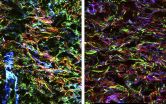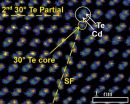New research shows fish intake associated with boost to antidepressant response
2014-10-20
(Press-News.org) Berlin, 20 October 2014 Up to half of patients who suffer from depression (Major Depressive Disorder, or MDD) do not respond to treatment with SSRIs (Selective Serotonin Reuptake Inhibitors). Now a group of Dutch researchers have carried out a study which shows that increasing fatty fish intake appears to increase the response rate in patients who do not respond to antidepressants. This work is being presented at the European College of Neuropsychopharmacology congress in Berlin.
According to lead researcher, Roel Mocking (Amsterdam):
"We were looking for biological alterations that could explain depression and antidepressant non-response, so we combined two apparently unrelated measures: metabolism of fatty acids and stress hormone regulation. Interestingly, we saw that depressed patients had an altered metabolism of fatty acids, and that this changed metabolism was regulated in a different way by stress hormones".
The researchers were looking at the relationship between depression and fatty acids, and various hormones, including the stress hormone cortisol. They took 70 patients with depression and compared them to 51 healthy controls, by measuring their fatty acid levels and cortisol levels. They then gave the depressed patients 20mg of an SSRI daily for 6 weeks, and in those who did not respond to the SSRIs the dose was gradually increased up to 50mg/day. Fatty acid and cortisol levels were measured during the trial.
They found that the MDD patients who didn't respond to the SSRI also tended to have abnormal fatty acid metabolism, so they checked the dietary habits of all those taking part in the trial. Fatty fish is rich in fatty acids, such as the well-known Omega-3 DHA. So the researchers looked at the amount of fatty fish in the diet of all involved in the trial. They categorised the patients into 4 groups, according to their fatty fish intake, and they found that those who took the least fish tended to respond badly to anti-depressants, whereas those who had most fish in the diet responded best to anti-depressants. Those who ate fatty fish at least once a week had a 75% chance of responding to antidepressants, whereas those who never ate fatty fish had only a 23% chance of responding to antidepressants.
Roel Mocking continued:
"This means that the alterations in fatty acid metabolism (and their relationship with stress hormone regulation) were associated with future antidepressant response. Importantly, this association was associated with eating fatty fish, which is an important dietary source of omega-3 fatty acids. These findings suggest that measures of fatty acid metabolism, and their association with stress hormone regulation, might be of use in the clinic as an early indicator of future antidepressant response. Moreover, fatty acid metabolism could be influenced by eating fish, which may be a way to improve antidepressant response rates".
"So far this is an association between fatty acids in blood and anti-depressant response; so it's not necessarily a causal effect. Our next step is to look at whether these alterations in fatty acid metabolism and hormonal activity are specific for depression, so we are currently repeating these measurements in patients with post-traumatic stress disorder and schizophrenia".
ECNP President, Professor Guy Goodwin (Oxford) said:
'Understanding non-response to treatment with SSRIs remains an important known unknown. There is already an intriguing association between eating fish and general health. The present study, while preliminary, takes the story into the realm of depression. Larger scale definitive studies will be of considerable interest".
INFORMATION:
ELSE PRESS RELEASES FROM THIS DATE:
2014-10-20
Berlin, 20 October 2014 A new study shows that some anti-inflammatory medicines, such as aspirin, estrogen, and Fluimucil, can improve the efficacy of existing schizophrenia treatments. This work is being presented at the European College of Neuropsychopharmacology conference in Berlin.
For some time, doctors have believed that helping the immune system may benefit the treatment of schizophrenia, but until now there has been no conclusive evidence that this would be effective. Now a group of researchers at the University of Utrecht in the Netherlands has carried out ...
2014-10-20
CHICAGO – Oct. 19, 2014 – The results of the largest retrospective study of multiple sclerosis (MS) in uveitis patients has revealed that nearly 60 percent of patients with both diseases were diagnosed with each within a five-year span. The study is being presented today at AAO 2014, the 118th annual meeting of the American Academy of Ophthalmology. While it has long been known that there is an association between the eye condition and MS, this is the first study to provide a detailed description of the relative onset of uveitis and MS and to calculate the ...
2014-10-20
After conducting an investigation about the current state of the operation of medium voltage distribution grids and the integration of distributed generation (DG) of renewable resources across China, scientists at the Key Laboratory of Smart Grid, under the auspices of the Ministry of Education, at Tianjin University in the east coast city of Tianjin, set out an array of R&D opportunities to modernize these grids.
Researchers Yu Yixin, Zeng Yuan, Liu Hong and Sun Bing state in a recent paper published on the Beijing-based journal SCIENCE CHINA Technological Sciences that ...
2014-10-20
The excessive activity of repair cells in the early stages of tissue recovery sets the stage for fibrosis by priming the activation of an important growth factor, according to a study in The Journal of Cell Biology.
Myofibroblasts are highly contractile cells that repair damaged tissues by replacing and reorganizing the extracellular matrix (ECM), the meshwork that fills the space around cells, in order to draw a wound closed. When myofibroblasts are not properly regulated, however, they continue to act on healed tissues and produce excessive amounts of ECM. Excessive ...
2014-10-20
Crystallographic defects or irregularities (known as dislocations) are often found within crystalline materials. Two main types of dislocation exist: edge and screw type. However, dislocations found in real materials tend to be a mix of these two types, resulting in a complex atomic arrangement not found in bulk crystals. The study of these dislocations in semiconductors is probably as old as the science of semiconductors itself, and the technological importance of dislocations can hardly be overstated. From their roles in the way crystals form to their effects on a material's ...
2014-10-20
Infection with herpes simplex virus increases the risk of Alzheimer's disease. Researchers at Umeå University, Sweden, claim this in two studies in the journal Alzheimer's & Dementia.
"Our results clearly show that there is a link between infections of herpes simplex virus and the risk of developing Alzheimer's disease. This also means that we have new opportunities to develop treatment forms to stop the disease," says Hugo Lövheim, associate professor at the Department of Community Medicine and Rehabilitation, Geriatric Medicine, Umeå University, who is ...
2014-10-20
A study by researchers of Ludwig-Maximilians-Universitaet (LMU) in Munich shows that infants fed on fresh rather than UHT cow's milk are less prone to infection. The authors recommend the use of alternative processing methods to preserve the protectants found in the natural product.
A pan-European study, led by Professor Erika von Mutius, Professor of Pediatric Allergology at LMU and Head of the Asthma and Allergy Department at Dr. von Hauner's Children's Hospital, reports that fresh cow's milk protects young children from respiratory infections, febrile illness and inflammation ...
2014-10-20
A desert at the bottom of the sea? Although the waters of the North Sea exchange about every two to three years, there is evidence of decreasing oxygen content. If lower amounts of this gas are dissolved in seawater, organisms on and in the seabed produce less energy – with implications for larger creatures and the biogeochemical cycling in the marine ecosystem. Since nutrients, carbon and oxygen circulate very well and are processed quickly in the permeable, sandy sediments that make up two-thirds of the North Sea, measurements of metabolic rates are especially difficult ...
2014-10-20
To make a decision for or against adjuvant chemotherapy, a test to measure the concentrations of the biomarkers uPA and PAI-1 in the tumour tissue is available for breast cancer patients. However, as suitable studies are lacking, it remains unclear for patients with an intermediate risk of recurrence which benefit or harm a treatment strategy based on this test may have for them. This is the result of the final report published by the Institute for Quality and Efficiency in Health Care (IQWiG) on 20 October 2014.
Adjuvant systemic treatments aim to prolong survival
Even ...
2014-10-20
Individuals who are genetically predisposed to obesity may soon have a therapeutic solution to combat their condition. A research team led by scientists from the National University of Singapore (NUS) has identified several potent inhibitors that selectively target FTO, the common fat mass and obesity-associated gene. These FTO-specific inhibitors pave the way for the development of novel anti-obesity drugs and treatments.
The research, led by Assistant Professor Esther Woon from the Department of Pharmacy at the NUS Faculty of Science, along with colleagues from the ...
LAST 30 PRESS RELEASES:
[Press-News.org] New research shows fish intake associated with boost to antidepressant response




